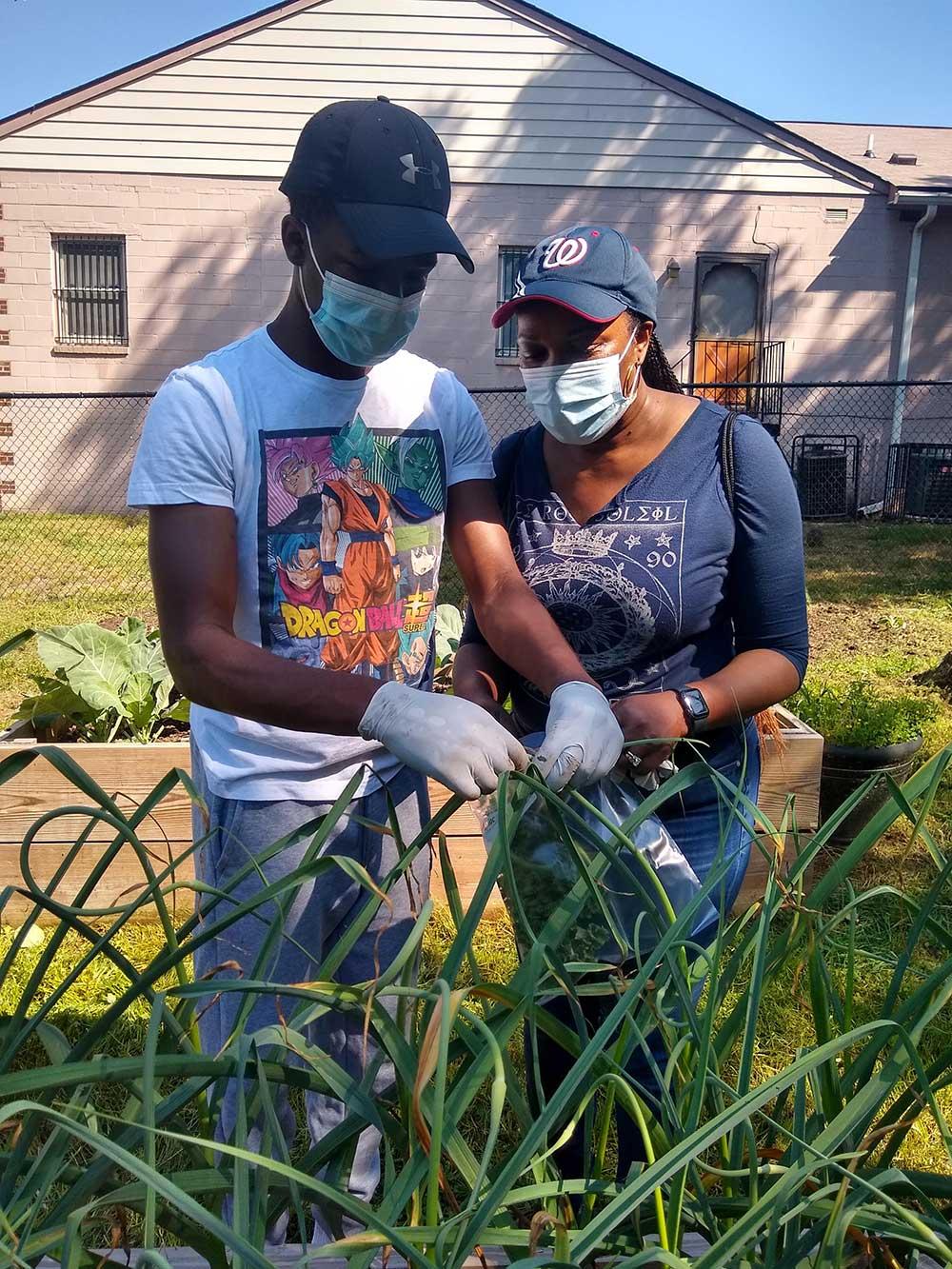Students and Faculty from Multiple Colleges and Disciplines Team Up For Community and Food Insecurity Efforts
During these uncertain times, the Mona Center Urban Farm in Temple Hills, Md, has provided a great deal of reliability for both its volunteers and the community it strives to support. The farm, officially established in 2019, is run through a collaborative partnership with the University of Maryland (UMD) College of Agriculture & Natural Resources (AGNR), UMD School of Public Health (SPH), UMD Institute of Applied Agriculture, Catholic Charities, and Luminis Health.
It is one of many projects at the Susan D. Mona Center for Health and Wellness, which serves as a multi-purpose center that provides health and dental care, legal and immigration services, and meals one day a week with produce supplied by the farm.
In their first full growing season, the Mona Center produced and donated more than 1,600 pounds of fresh produce that was distributed locally to those in need through the Catholic Charities’ KitchenWork program. The program delivers 400 meals a week from Mona of the 2,000 to 4,000 meals they deliver weekly.
“Mona Farm is an excellent example of both the university and the college fulfilling its role in serving Prince George’s county,” says Nina Jeffries ’22 (Environmental Science & Policy). “The farm provides produce, but it also serves as a learning space where residents can learn about urban agriculture, gardening/farming, incorporating fresh produce into their diets, and connecting with the outdoors. It’s also a success story of starting and operating a small-scale urban farm during COVID.”

The Mona Center Urban Farm was part of the vision set in motion through a partnership launched in 2016 between Catholic Charities and the UMD School of Public Health. The farm was then brought to life thanks to support from multiple AGNR departments including Plant Science and Landscape Architecture, Nutrition and Food Science, Institute of Applied Agriculture, and Prince George’s County Extension, as well as Tjaden Design Associates.
While much of the work at the farm now is done by volunteers and UMD students, it took a chance encounter between two UMD faculty members to help kick efforts into gear.
“One day, I was walking out of the School of Public Health building past the Community Learning Garden, and I wave to the person working in the garden, and that was when I met Meredith Epstein from the Institute of Applied Agriculture,” says Stephen Thomas, professor of Health Policy and Management in the SPH, who directs the Maryland Center for Health Equity. “I said, ‘what a great project here with this garden,’ and I began telling her about what we were trying to do at the Mona Center.”
Since 2016, Thomas has annually taught the Fearless Ideas course "Redesigning Health Care – Developing a Clinic to Meet Community Needs" in which UMD students apply “design thinking” and propose creative ways to engage the community in improving health. Given that Temple Hills lacks a full service grocery store and is considered a “healthy food priority area,” increasing access to fresh produce and teaching community members how to grow food through the urban farm was a great place to start.
From there, Epstein connected Thomas with several key collaborators from AGNR including Jack Sullivan, associate professor in Landscape Architecture, who got his students involved with renderings for the location, and Margaret Udahogora, lecturer in Nutrition & Food Science, who helped design a teaching kitchen that would be suitable as a classroom space for students.
Together, Thomas and Epstein now serve as advisors to the farm.

“Thanks to funding from the Maryland Center for Health Equity, we have been able to support paid internships for students who can bring their agricultural expertise to the Mona Center Urban Farm,” says Epstein. “From crop production to community outreach, it doesn't get more hands-on than these opportunities. Our students are doing an amazing job applying their skills to alleviate real-world problems like food insecurity in our own community.”
What’s in store next for the center? For now, another growing season and continued community outreach efforts including their first-ever public event, an open house, on Saturday, September 11 that will feature farm tours, outdoor fitness classes, cooking demonstrations using farm produce, community painting activities, and a Prince George's County urban farmers meet-up and marketplace.
For students like Jeffries, it has provided a whole new perspective on how to continue their learning outside of the classroom setting.
“This should be the new normal,” says Jeffries. “One of the fundamental ways to help combat food security is to make farming more accessible. Knowing where your food comes from is something that empowers you to do more and support people. Community gardens are important to introduce and teach people about agriculture. Many don’t know farming can exist in an urban setting and it can be empowering because it connects people back to their food and agriculture.”